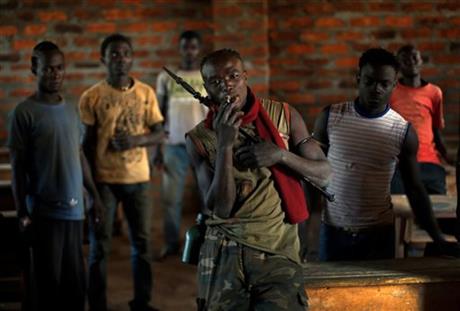
By SYLVIE CORBET
Former FARCA (Central African Republic Forces) soldiers linked to Anti-Balaka Christian militiamen who have set up camp in a school in the Boeing neighborhood of the Central African Republic’s capital Bangui pose Sunday Dec. 15, 2013. The leader of the Christian militia says his fighters won’t put down their rebellion until President Michel Djotodia is gone from power, raising the specter of a prolonged sectarian conflict in the country.More than 600 people have been killed since Anti-Balaka launched a strike over Bangui last week before being pushed back. (AP Photo/Jerome Delay)
Catherine Ashton, Laurent Fabius
French Foreign Minister Laurent Fabius, right, talks with EU foreign policy chief Catherine Ashton, during the EU foreign ministers meeting, at the European Council building in Brussels, Monday, Dec. 16, 2013. European Union foreign ministers meeting Monday argue that the door remains open for Ukraine to sign an association agreement the EU, even though they criticized the delaying tactics and mixed messages sent by Ukraine President Viktor Yanukovych. (AP Photo/Yves Logghe)
Prev 1 of 2 Next
PARIS (AP) — France is pushing its European partners this week to create a fund to pay for overseas military interventions, like the operation France is leading in the Central African Republic. Other European governments, coming out of years of economic troubles, aren’t too excited about the idea.
The dispute exposes a divide between France, which has several military bases abroad and argues that Europe has a responsibility to former colonies in Africa, and countries like Germany that are wary in today’s economic times of intervening and spending taxpayer money abroad.
If European countries were to pitch in to such a fund, they would likely want to decide how that money is used — and might not want France sending its troops in to foreign theaters so often.
French President Francois Hollande defended the Central African Republic intervention Monday, while paying homage to two French soldiers killed in combat amid sectarian violence in the largely lawless country.
If France “weren’t there, no other army in this part of the world — Africa — would be able to launch such an operation to save lives and establish peace,” Hollande said.
He called last week for a “permanent European fund” to finance emergency military interventions in crises, before a U.N. peacekeeping operation can be put in place, and will push the idea at a summit of European Union leaders Thursday and Friday. This fund could also be a step toward a common European defense system, an idea Hollande has been pushing to little avail.
At an EU foreign ministers’ meeting in Brussels on Monday, EU foreign policy chief Catherine Ashton said it’s up to the 28 member states to decide “how they want to use their resources.”
German Chancellor Angela Merkel, who will meet Hollande in Paris on Wednesday, said last week: “We will have to talk about it in Europe, that is still a matter for discussion.”
Understanding “French concerns,” Dutch Foreign Minister Frans Timmermans said “it is an interesting idea. But is just an idea at this stage.”
The Poles support the principle of coordinating Europe’s efforts in crisis situations, but want to hear the specifics of Hollande’s proposal and the reaction of other EU countries.
“If other countries are to contribute then they need to have a say in the policymaking too. And that’s precisely where I see the problem,” said Sabine von Oppeln, a political scientist at Berlin’s Freie Universitaet. “On the one hand France conducts a unilateral Africa policy, on the other hand they demand solidarity from other Europeans.”
France has struggled to persuade other Europeans to help with the operation in Central African Republic, a former French colony. While countries including Poland, Britain, Germany, Spain and Belgium have provided various forms of assistance, French troops are the only Europeans on the ground. The European Union provides 50 million euros ($68 million) for the African Union-led mission in the country.
___
Raf Casert and John-Thor Dahlburg in Brussels, and Frank Jordans and Geir Moulson in Berlin, contributed to this report.



